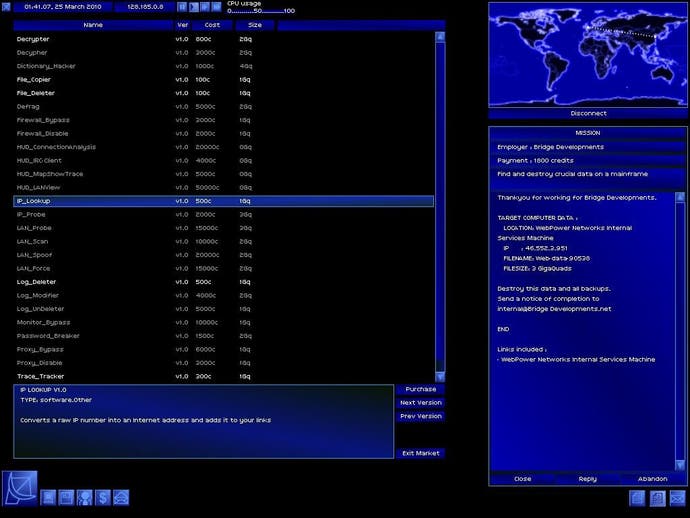Retrospective: Uplink
Beep boop beep ba beep bo boop ba beep.
But it's always about those countdown timers. It's always about sneaking in as much as you can before the counter reaches zero. It's always about that chase.
Hacking into a computer may require you to bypass a proxy server. There's a countdown. And of course hack a password, maybe a cipher. That's two more. You may need to play some voice-recognition software in time, copy a large number of files, and of course then get into the logs and delete any trace of your having visited.
All the time there's that mother of all timers, the Trace Tracker, which if you've upgraded it enough will be counting down the few seconds until you'll be traced. It's about economising time, but also furiously scrabbling. It's about that awful moment of wondering if you can just hold out long enough to finish this task, and still clear the logs, or if you need to abandon the mission and just get out of there.
Because failure isn't instant. That's the real fear in Uplink. Failure creeps up on you.
I think it taps into a nightmarish fear that we all must have experienced at one time. That thing we did, or may have done without knowing it, that catches up with us. Like that time I paid for a packet of Fruit Pastilles in pennies, knowingly one coin short, and the man in the petrol station said to me: "I won't count it. I'll trust you." Mobil closed down a few years later, which surely has to be at least partly my fault, and I know that one day the policeman will knock on my front door. I'll look up from the jigsaw puzzle I'm completing with my wife and our two children, and he'll say, "Are you John Walker? I'm going to have to ask you to come with me."

Uplink's endings are as sudden. You were on a hack, things got backed up, and you overestimated how long it would take you to clear the logs. Some of them survived, and even though you closed the connection down before an active trace could identify you, the company completed a passive trace later on. It's a couple of days later, you're doing other work, and the screen goes black.
The Uplink organisation destroys your gateway computer and all records of you, and denies any knowledge. You're done, it's all over.
It's interesting that after a failure, you can start a new game, with a new account - the old in-game login will never work again - and blitz through the early stages far more efficiently that before. And this time you can refine things, spend money on new software and hardware more efficiently, make better use of registered accounts on servers for routing your connections. Rather than a time of tediously repeating yourself to get to the good bits, it can be a time of feeling ruthless and powerful, making you better at the skills involved, more ready to get further this new attempt.
It's so very smart, and so deeply involved. It's important to remember why Chris Delay and Introversion didn't need to pay to advertise this game - why word of mouth was not only enough to see it spread widely, but also to gain the company the reputation that saw the British gaming press so very excited about, and latterly delighted by, Darwinia. It's still properly great.


